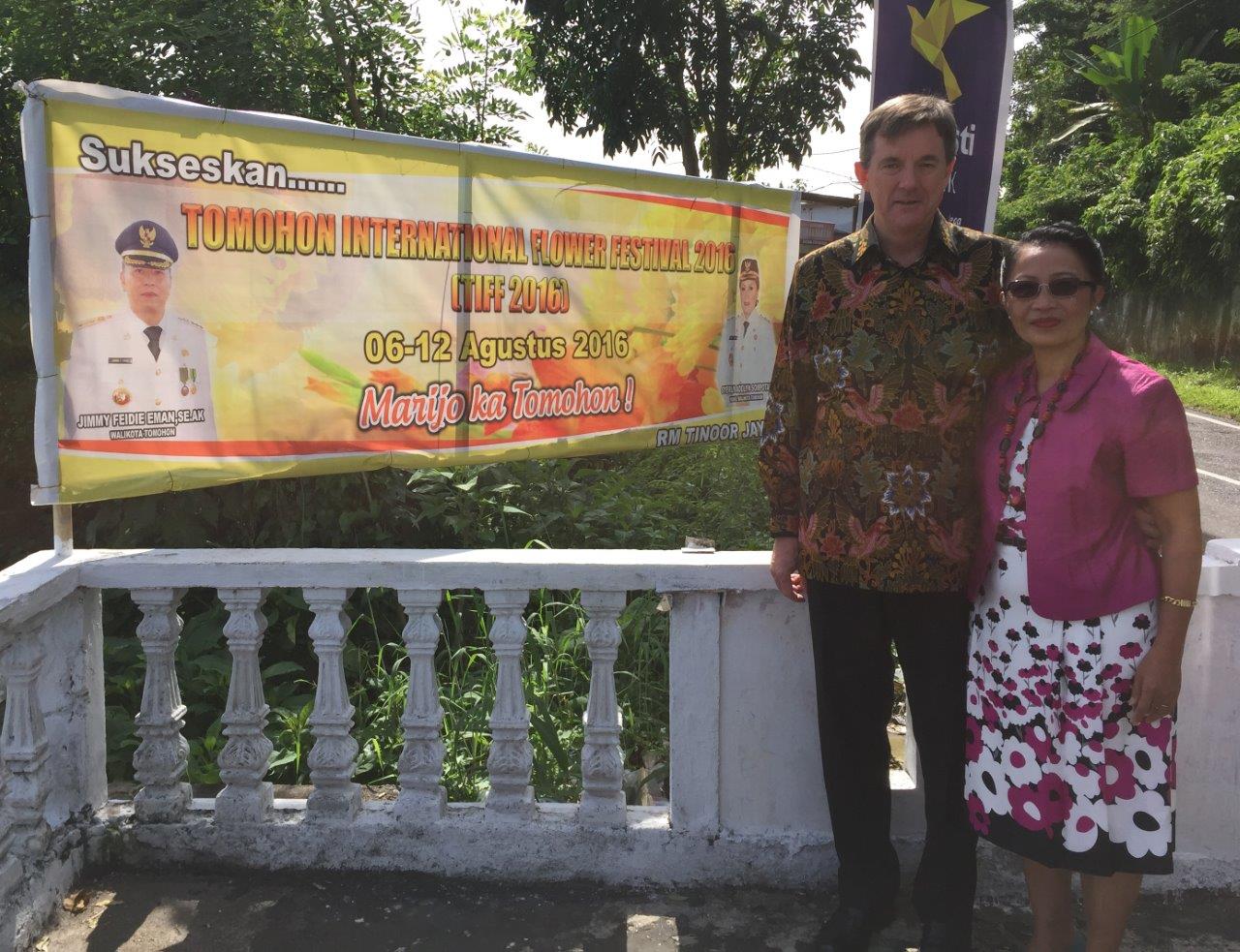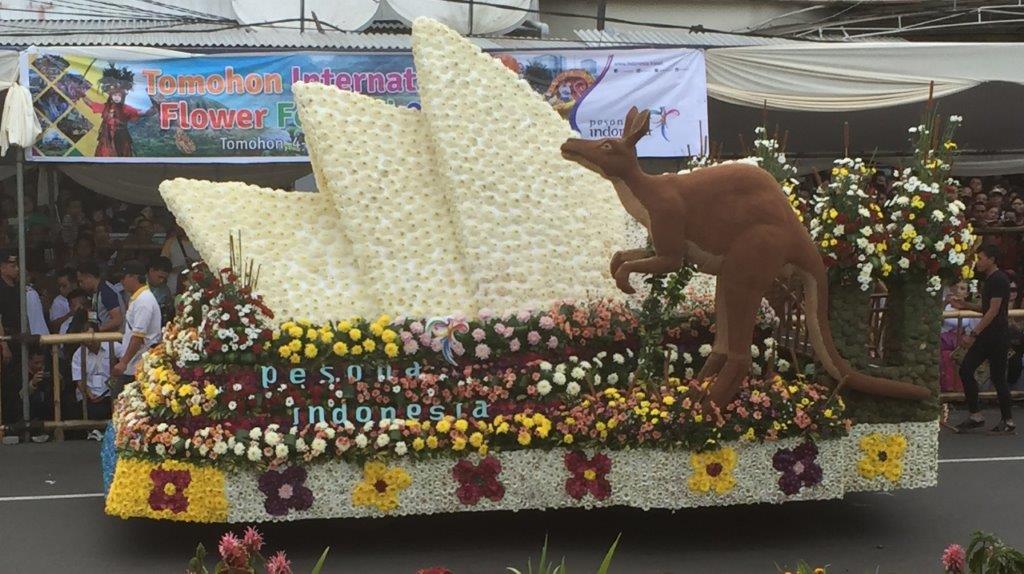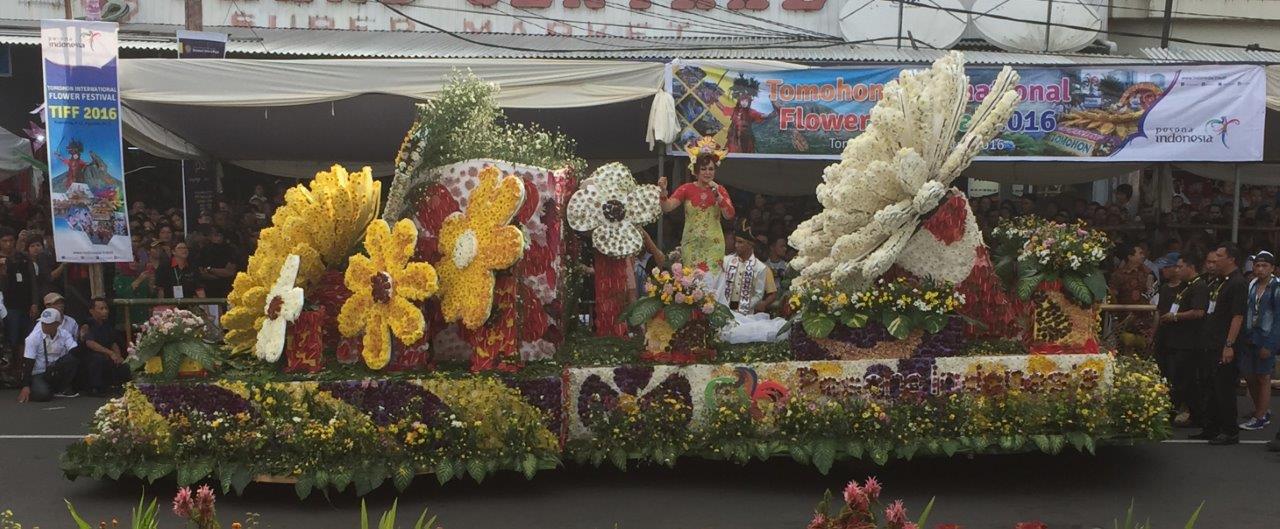Across eastern Indonesia there is an interesting variety of city festivals, some in intriguing places and set against delightful backdrops. Makassar has its “International EIGHT” festival (@f8_makassar) along the Pantai Losari waterfront in early September: Mayor Danny Pomanto wants to celebrate food, fashion, film, fusion jazz and fiction writing among other things (Australia will contribute towards the food component).
Ambon has its “In the Steps of Pattimura Festival”. Manado is planning a big festival for September 2017. Pretty Baubau in Buton has a “Makasar Island Festival” (because it has an island called Makasar just offshore). Festivals are good for tourism and local business.
Recently we were delighted to attend a unique festival in the mountain town of Tomohon, just outside of Manado in North Sulawesi: the Tomohon International Flower Festival. Tomohon is set on the slopes of the Lokon volcano, a perfect cone-shaped mountain that towers over Manado. Locals are comfortable living so close to the volcano. They say when it erupts it generally spews ash towards Manado, not Tomohon.

But Tomohon is more famous for its flowers. It enjoys a cool and comfortable climate, tropical but tempered by gentle winds and average temperatures in the mid to high twenties. The white Tomohon chrysanthemum is abundant. Six years ago the Mayor and his officials began promoting the city through a festival and parade of flower-bedecked floats. The festival went “international” with the inclusion of floats from various friendly nations. This year there were floats from Australia, China, Japan and Singapore. As it happened we were the only actual foreign diplomats attending the festival.
Our float depicted the Sydney Opera House, the Sydney Harbour Bridge, a kangaroo and an emu. Clichéd but clearly Australian! Our float decorator – Mr Nyong Napu – received the jury prize for “most creative float”, no doubt for his skill in cramming all four symbolic emblems on to a car-sized float decorated with chrysanthemum and other floral attributes.

On arriving in Tomohon we were looked after by three young people designated as our liaison officers. All bright young university graduates, fluent in English and interested in Australia. They took us the main stage, where we were assigned seats in the second row. I sat just behind Akbar Tanjung, a former minister, former Chair of the Golkar Party and former speaker of the House of Representatives. This festival is clearly attracting some high level national interest. After an hour of waiting we all stood up for the arrival of the Governor of North Sulawesi accompanied by former President Ibu Megawati Soekarnoputri.
After another hour of speeches - in which the key point was to acknowledge all the VIPs in the right order - the parade began. First with a demonstration by police men and women of their motorcycle riding skills; then a performance by some youth dancing groups; then singing; performances by various Kolintang groups (wooden xylophone – very popular in the Minahasa district); more singing; various tribal dances; more singing; a parade of young women dressed in creative flower costumes; more singing; then eventually the flower floats began to pass the main stage. And then there was more singing.
Indeed the deputy Mayor of Tomohon who had been sitting right in front of us, suddenly appeared aboard the Tomohon City’s own float as it passed the stage – singing. She belt out a number of local love songs, and they were good. You may have gathered by now that the people of North Sulawesi, like the Ambonese, love singing. Some of the nation’s great crooners come from Manado.

North Sulawesi – the Minahasa district in particular – is a melting pot of cultures. Manado city itself – population around 600,000 – has a Chinese quarter, an Arab quarter, even a Portuguese descendants cemetery. The Dutch influence in Minahasa was very strong as the local rulers formed an alliance with the Dutch from the late 17th century. In the late 19th century the Dutch began direct rule of the province and people from Minahasa got preferential treatment in education and civil service positions. Many young men from Minahasa were recruited to serve in the Dutch colonial army (the KNIL).
Partly because of European influence most people in Minahasa are Christian – mainly from various Protestant denominations, with a small proportion of Catholics. Churches are on every street corner, and more. There are large Muslim communities too, Buddhist and Daoist (mainly the Chinese), and even a Balinese transmigrant community with its own temple.
All live in harmony, now. Through the difficult times of the late 1990s and early 2000s, when religious riots and killings took place in Maluku, Sulawesi and other parts of eastern Indonesia, Minahasa stayed peaceful. The Mayor of Manado, Vicky Lumentut, told me this was because following anti-Chinese riots in Manado in 1970, the local government formed an inter-faith community council to manage tensions and avert local religious conflicts. This system of discussing differences and resolving problems – indeed a long tradition among Minahasa’s previously warlike tribes - has worked well.
We left the Tomohon International Flower festival as the sun began to set. I suspect the local community was only just getting ready to continue their big party through the evening, with lots of singing.
***
